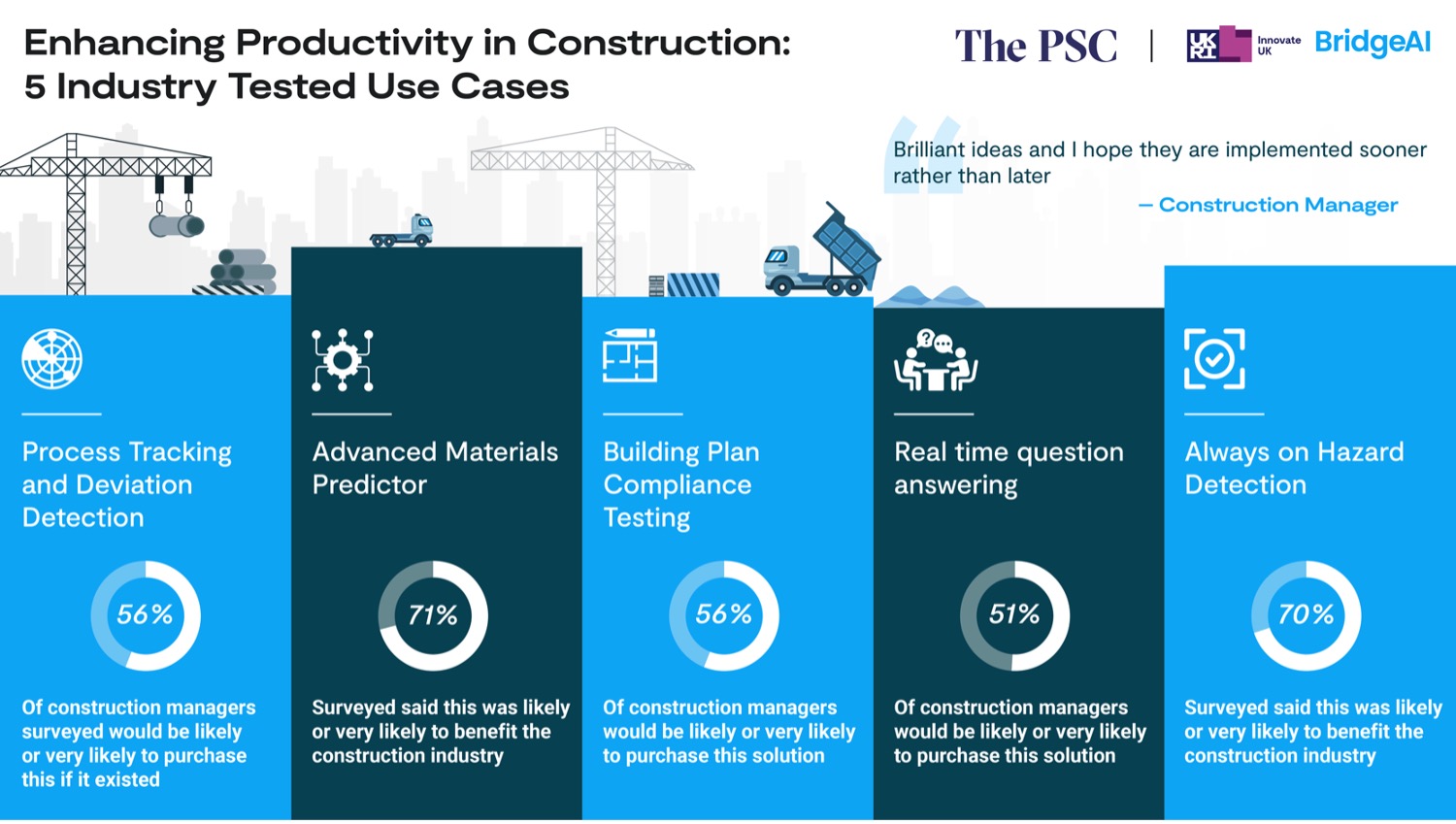Revolutionising construction: 5 AI powered ideas for supercharging productivity
The construction industry employs 2.15 million individuals in the UK and is central to ensuring that our future homes and cities are safe, sustainable and built to last. But to focus on these important contributions, construction companies need to be supported to work more productively and leverage the many exciting technologies and capabilities that AI unlocks.
From the report
Working with technologists, construction industry thought leaders, and academics, we have identified five major use cases to prioritise for AI development, with the combined potential to create billions of pounds in value for the industry.
If you want to transform how we build, here’s where you might want to focus…

Productivity enhancing use cases
-
Construction firms find it challenging to precisely monitor and manage each element within the complex web of tasks that comprise construction projects. Reliant on manual data collection, human observation, and continually cross-referencing project plans, they often face the risk of missing issues. Ultimately resulting in expensive and time-consuming rework down the line.
An automated system to continuously track progress in real time against the most up-to-date project plans. Instantly detecting and flagging any deviations, enabling immediate corrective action.
What industry says:
56% of construction managers surveyed would be likely or very likely to purchase this if it existed.
-
The supply chains and market for construction materials are difficult to predict and even more challenging to manage. Faced with poor vertical coordination, uncertain material availabilities, differing specification standards and unanticipated disruptions, firms currently struggle to order optimal material quantities. Often leading to delays or waste.
A solution that can read construction plans to provide accurate quantity estimates, recommend the best available materials, and secure the best prices based upon real-time market information.
What industry says:
71% surveyed said this was likely or very likely to benefit the construction industry.
-
Ensuring safety and quality in construction projects demands strict adherence to an extensive list of building regulations and planning requirements. Currently, this responsibility rests with highly skilled but expensive experts manually scrutinising plans against these rules. Any lapses in compliance can lead to the removal of non-compliant work or costly rework when issues are uncovered. Not only inflating costs but also causing frustrating delays.
A solution where designers can input project plans and receive instant checks against up-to-date building regulations. Flagging any issues and providing recommendations for their resolution.
What industry says:
56% of construction managers would be likely or very likely to purchase and use this solution.
-
Construction projects are a complex collaboration between a variety of sub-contractors, often only on site to complete specialist tasks to short timelines. However, information is not shared effectively and considerable time is wasted as the look for answers to their task-critical queries. Lacking necessary information tradespeople are left with a dilemma: continue to search for answers creating further delays and possible timeline overruns, or proceed with a ‘best guess’ approach, running the risk of errors.
A solution for tradespeople to receive immediate, remote answers to any questions they have about the construction process, using the latest project plans as a reference.
What industry says:
51% of construction managers would be likely or very likely to purchase and use this solution.
-
Construction is a dangerous industry, and with heaving machinery, multiple obstacles, and uncertain terrain it can be difficult to identify and predict all possible hazards. Failure to detect and mitigate risks can result in workplace injury and illness, as well as non-compliance with Health and Safety regulations.
A system that continually monitors their sites, flagging potential hazards before issues arise, and providing recommendations for their resolution.
What industry says:
70% surveyed said this was likely or very likely to benefit the construction industry.
What are the takeaways?
- Productivity in simplicity: The construction process is complex, from supply chains to sites and the relationships between contractors. Leveraging AI to reduce this complexity and enhance collaboration can fast-track productivity increases within the sector.
- Getting it right first time: Featured within several use cases, rework costs the construction industry hundreds of millions annually. Caused by a multitude of factors, improved planning, better communication, and accurate error detection are just a few ways to drive productivity and save millions.
- Dual focus on sustainability: As the UK’s leading polluter, the construction industry must balance productivity and sustainability. Fortunately, many AI-driven innovations that reduce waste, minimise errors, and ensure regulatory compliance can also help the industry reduce its environmental impact.
So, what’s your next move?
- Explore: Take a look at the report and visit the BridgeAI programme page to discover how the programme can benefit you.
- Innovate: Dive deep into the use cases we’ve outlined or create your own. Your innovation could be the one that changes the game!
- Apply for funding: Don’t hesitate; the opportunity is knocking. Apply for the latest BridgeAI competition to receive up to £1.2 million for your project and turn your AI idea into reality.
- Subscribe: Stay updated with BridgeAI to make sure you don’t miss out on future opportunities!
Related programme

BridgeAI
Empowering UK organisations to harness the power of AI through support and funding, bridging the AI divide for a more productive UK.

